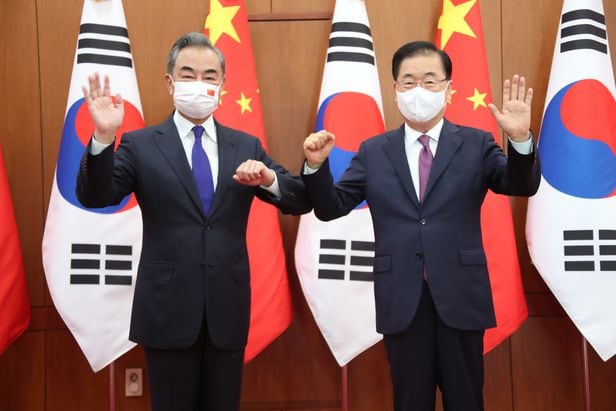
With the South Korean government and people immersed in domestic politics ahead of next year’s presidential election, East Asia is experiencing the turbulence of a tectonic change in strategy. The end of the Cold War in 1991 is drawing the 30-year-old U.S.-Japan-China relationship to a close, and “Cold War 2.0” is starting between the U.S. and China. The United States, which launched the Quadrilateral Security Dialogue alliance in March aimed at dealing with China, formed a united global front against China through the Group of Seven and NATO summits in June. Decoupling is also underway to isolate the Chinese economy from liberal democracies through China’s advanced science and technology control system, reminiscent of the Cold War era Communist Party Export Control Committee.
After the United States withdrew from Afghanistan last month to “concentrate its military forces on the China front,” the anti-China coalition movement is accelerating to contain China’s military activity aimed at overcoming the current status quo in East Asia. All U.S. allies in the Asia-Pacific region, excluding South Korea, are participating in Operation Freedom of Navigation challenging China’s territorial ambition to illegally incorporate 90% of the South China Sea’s pollution zones into its territorial waters, a region which is 15 times size of the Korean Peninsula. And Britain and France are joining in. As such, tensions in the South China Sea, which are sparking a confrontation between the liberal democracies and China, are moving north into the Taiwan Strait. Given that the U.S. recently showed signs of recognizing Taiwan as a state, China, adhering to the One China principle, is professing its right to occupy Taiwan by force. If China invades Taiwan, there are many who predict that Japan, seeking an opportunity to rearm, will join the battle in the name of collective self-defense.
In this tense struggle for hegemony between the U.S. and China in East Asia, China faces three disadvantages. First, in the event of an armed conflict between the U.S. and China in the near future, China’s military power cannot compete with the U.S. Second, in the event of an armed conflict between the U.S. and China, many U.S. allies in Asia and Europe are expected to participate in the war — but none of China’s allies, including Russia, North Korea, Iran and Pakistan, will fight alongside China. Third, the possibility that China will overtake the United States economically and militarily at some point in the future has greatly decreased due to the economic downturn caused by U.S. economic sanctions and its decoupling policy.
In addition to this unfavorable situation, the U.S.-British-Australian AUKUS Security Consultative Agreement announced last week was a big shock to China. Until last year, Australia had taken a very pro-China position due to its dependence on trade with China, which surpasses that of Korea. However, when China imposed heavy sanctions as a “tame” measure in response to Australia’s unfriendly attitude to the Hong Kong situation and the COVID-19 issue, the Australian government chose a bold, head-on response at the risk of economic loss, asserting that sovereignty is not subject to negotiation. Australia’s attitude was contrary to the Korean government’s low-profile response to Terminal High Altitude Area Defense sanctions. In the aftermath, Australia suffered significant economic losses, but as a member of AUKUS, which supersedes the Five Eyes, it will gain a large fleet of nuclear submarines and will be reestablished as a new military power to deter China’s advance into the Western Pacific.
At a time when military tensions in East Asia are escalating and the world’s advanced civilizations gather on the other side of China, South Korea, an ally of the United States, is caught up in its domestic political agenda and trapped in a world of its own, isolated from the rest. The South Korean government is not interested in the North Korean nuclear program. However, the confrontation between the U.S. and China, or in the South China Sea, is immersed in demonstrations of inter-Korean peace for the sake of domestic politics, dealing with and not dealing with China, America’s enemy. South Korea is also in steady agreement with China on numerous pending issues between the United States and China, such as THAAD deployment, accession to the Quad, the South China Sea, Hong Kong and Huawei.
An alliance is a pledge between nations to fight together in the event of a war. There is no ground for neutrality or unbiased diplomacy. Sovereign states have the right to terminate alliances any time they wish. But maintaining the alliance and doing business with the enemy of the alliance betrays that alliance. The Korean government’s blind, pro-China diplomacy, which takes its sovereignty and national dignity hostage, is detrimental to the national interest, and goes against history and public opinion. According to a Pew Research poll, 77% of Koreans dislike China, ranking fourth in the world to feel that way. If most of the people are so aroused by this, now is the time for our government to wake up from its nightmare and obsession with China and face the real world.

Leave a Reply
You must be logged in to post a comment.